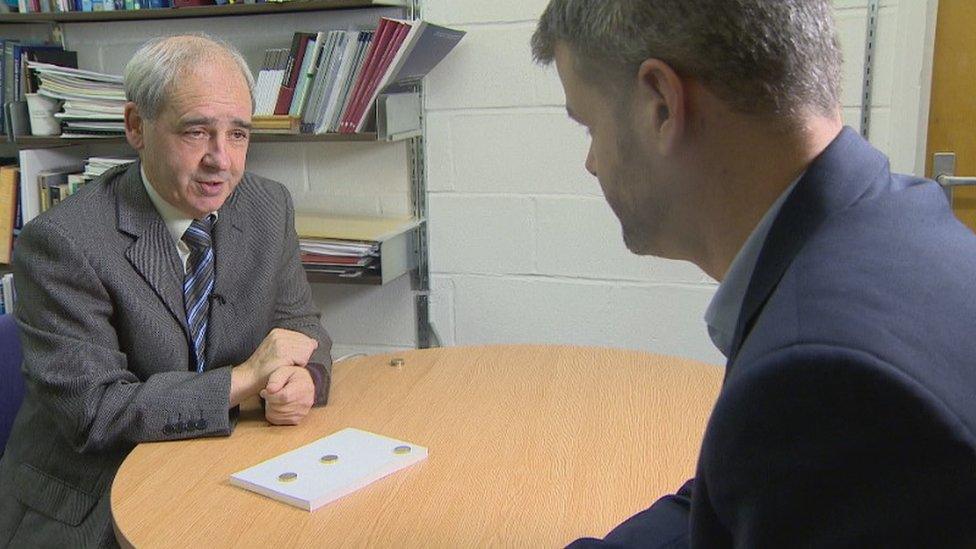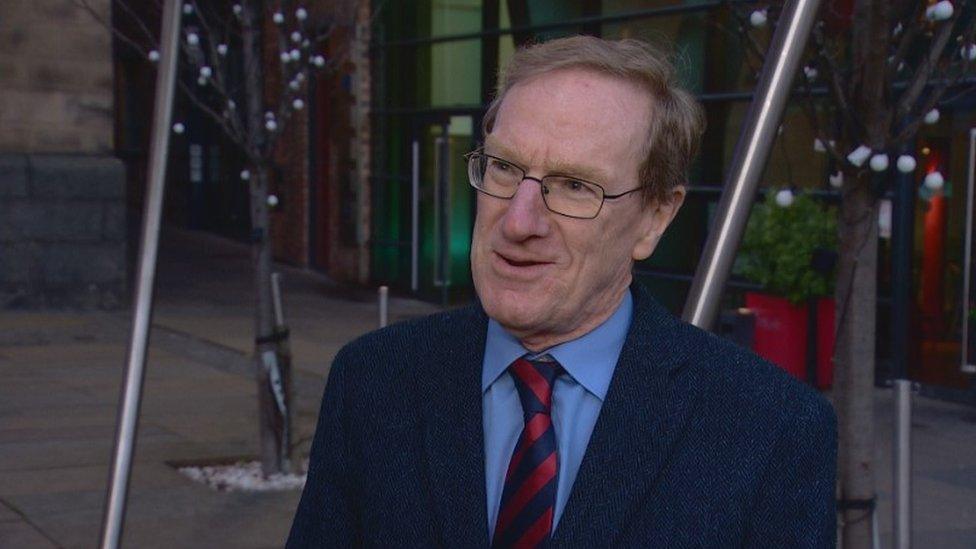Fiscal framework: What is Scotland's new funding deal?
- Published

Let's talk about Scotland's new fiscal framework.
Okay, okay but before you nod off, it is worth pointing out this is a vital issue which goes to the heart of new powers for Scotland.
The Scotland Bill, currently making its way through Westminster, stands to transform Holyrood into one of the world's most powerful devolved parliaments - or so we're told by the UK government.
Edinburgh is on course to gain major new tax and welfare powers - but that's currently being overshadowed by a debate about whether it can be done fairly.

Barnett barney

The Scottish Parliament is due to gain major new powers
At the moment, most of Scotland's £30bn annual budget is funded by the UK Treasury - known as the block grant - and the amount of cash which goes into the pot is worked out under the Barnett Formula.
Once Holyrood gets more power to raise its own tax money, the amount of Barnett cash which comes north of the border will be cut.
Year One of these powers is straightforward enough - if you get £10bn worth of cash-raising powers, £10bn is then deducted from the block grant.
But things start getting complicated in future years, where tax policy in Scotland and the rest of the UK could begin to look very different.

Potential options

Prof David Bell argues that finding the perfect solution will be very tough
The Smith Commission, set up by UK ministers to agree which new powers should be transferred from Westminster to Scotland, said the final agreement shouldn't put Scotland at a disadvantage.
It's been called the "no detriment" rule - but some experts argue that's a near impossible task.
Economist Prof David Bell, said: "You have to have detriment.
"If you are taking on new powers, then you take on the risk that something goes wrong in the economy and you don't get the tax revenues that you expected.
"You cannot have a situation where, under all states of the world, things will be no worse than they would be under the current Barnett Formula."
Prof Bell, of Stirling University, has co-authored a report by the IFS economic think tank, external, which has looked at various ways of adjusting the block grant.
Each has its pros and cons - and getting your brain around the economic theory isn't easy.
But three different options for working out how to cut the block grant have emerged:
Indexed deduction - where Scotland's grant declines at the same rate as income tax revenues in the UK as a whole.
Per capita indexed deduction - another version of the above option, which takes in the fact that Scotland's population is growing more slowly than the rest of the UK (and is thought to be the Scottish government's preferred option).
Levels adjustment - Scotland would get a population share of a change in taxes in the rest of the UK (a lot like how the current Barnett Formula works).
Getting it right is crucial.
The economist and Glasgow University Principal Anton Muscatelli has warned a bad deal could leave Scotland hundreds of millions of pounds worse off within a few years.

'Messy fudge'

Prof Michael Keating said the final decision would be based on compromise
The UK and Scottish governments are committed to keeping the Barnet Formula - which partly allocates money based on population - despite much debate over the years on replacing it.
The political scientist, Prof Michael Keating, has a view on the ultimate outcome - and because politicians are involved, you've probably heard this one before.
"It will be a political compromise - it always is," said the Aberdeen University academic, adding: "They'll get something in between and then they'll give it a name, like the Barnett Formula.
"A lot of people said we should have a formula based on need, and you raise some of your own revenue.
"But politicians have shied away from that one, and they're going to back away from it this time, because they'll never find it easy to agree what that formula should be.
"So we'll get a messy fudge."
And time is now running out.
Talks to agree Scotland's new funding deal, being conducted behind closed doors between the Scottish and UK governments, have so far not produced a result.
However, everything needs to be wrapped up well ahead of the Scottish Parliament election in May.
Without a proper fiscal framework, there remains a question mark over the prospect of Holyrood getting new financial powers.